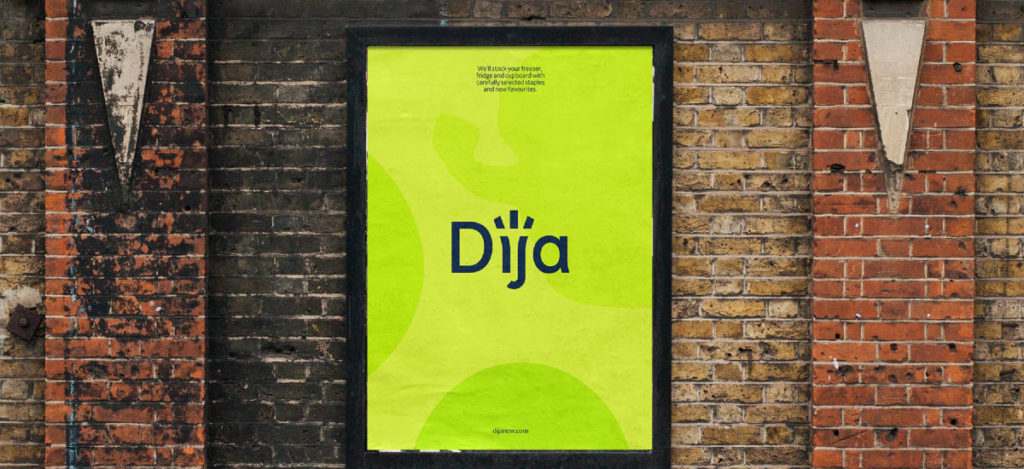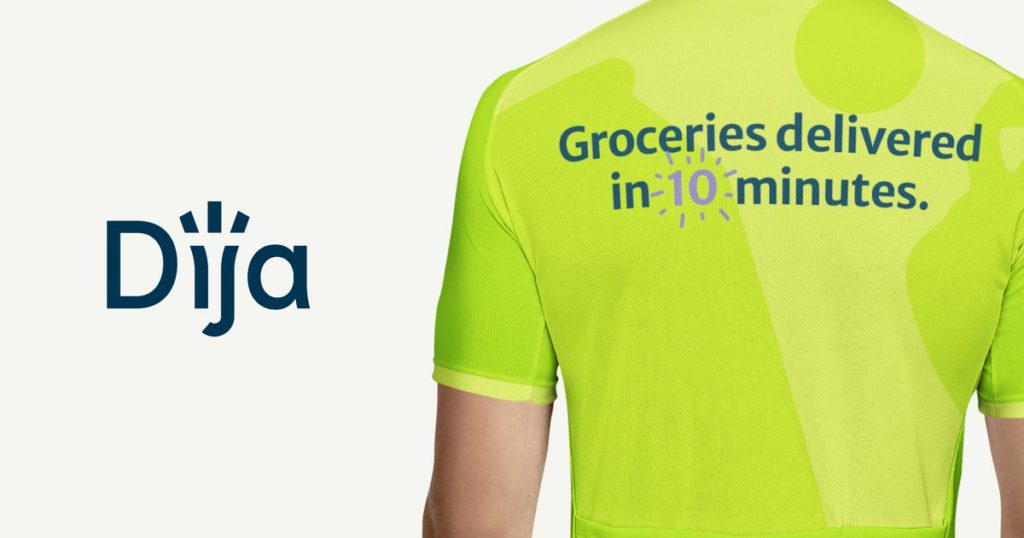
During the current pandemic and as more and more people become accustomed to buying online, the online grocery industry is gaining traction. According to Capgemini’s study, 56 percent of UK customers expect internet deliveries at least thrice a week by 2021. Speaking of which, let’s discuss the Dija business model, the London-based rapid grocery delivery service.

What is Dija?
Dija, a new U.K.-based firm created by senior former Deliveroo employees, is on the approach of obtaining $20 million in cash, according to TechCrunch.
According to several sources, Blossom Capital, the early-stage venture capital firm created by ex-Index and LocalGlobe VC Ophelia Brown, is leading the round, which has yet to close. It’s unclear who else is in the race, but I’m told the competition was strong, and the business secured funding from a number of top-tier investors. Dija, as well as Blossom Capital, declined to comment.
Dija, which has yet to start, is a convenience store and distribution business founded by Alberto Menolascina and Yusuf Saban, both of whom formerly held prominent roles at Deliveroo.
Menolascina formerly worked as the head of Business Planning and Growth at the takeaway distribution juggernaut, among other positions. He has previously worked at Just Eat and co-founded Everli (formerly Supermercato24), an Italian supermarket delivery business comparable to Instacart.
Saban formerly worked at Morgan Stanley as the CEO of Deliveroo’s chief of staff.
Meanwhile, all that is known about Dija is that it will distribute groceries and fresh products through a “dark” convenience store concept, with hyper-central fulfillment centers being constructed out in high-density urban regions for super-fast delivery. It’s likely to be comparable to goPuff, a firm in the United States backed by Accel and SoftBank, or Weezy, a startup in the United Kingdom.
How did Dija manage to stand out from the crowd?
- Dija promised their customer to deliver free groceries if they fail to deliver groceries within 10-minutes.
- Dija business model identified and addressed its customers’ pain points. The startup’s super-fast grocery delivery managed to provide convenience to its customers by delivering popular items on time.
- Menolascina thinks that depending on dark stores (rather than supermarkets) increases your chances of success in the fast-growing grocery delivery business.
- The value of optimal space usage is dimmed by hyper-local delivery-only fulfillment centers, often known as Dark stores. These eCommerce warehouses eliminate the need for cash registers and merchandising, reducing the requirement to hire additional staff to operate the facility even more.
- Unlike supermarkets, dark retailers do not require premium real estate. It makes no difference if you are present in public. A low-cost space might be more practical as well.
Inside the dark store
Dark store startups also have lower operational expenses than high-street supermarkets since they employ fewer employees and can make better use of space.
“A supermarket is designed for the aesthetic experience,” Menolascina explains. Dark stores aren’t necessary.
This implies that things may be kept near other items that are often purchased with them, as is the case at Amazon fulfillment centers. It doesn’t make sense to have a pasta aisle and a cheese area if you’re aiming for quick packing. It makes sense to keep the beer near the snacks and the diapers near the baby food.

10-minute grocery delivery
Users may order groceries and have them delivered to their houses within 10 minutes, according to the company’s rules. If the order does not come within 10 minutes, the Dija business model will deliver groceries for free for the next three months as part of their no-questions-asked turnaround promise.
“What distinguishes Dija is our experience and devotion,” Menolascina says. My co-founder and I have been in the food delivery business for quite some time. We understand what consumers want when it comes to groceries and food because of our time at Deliveroo and my experience launching Everli (a same-day grocery delivery firm in Italy).
This experience is combined with our commitment to offering a high-quality, dependable, and timely service. Our 10-minute delivery guarantee is key to our commitment to providing clients with great service at all times. This will set Dija apart from the competitors.”
Dija utilizes data to increase efficiency and recognize purchase trends to ensure speed and dependability so that its clients do not have to deal with replacements or missing goods. Customers will be able to purchase branded food and non-perishable products, as well as fresh produce, through Dija.
Dija Building a $100bn grocery business in a rapidly expanding market
Even before the epidemic, supermarket delivery apps and platforms were becoming increasingly popular, and the sector is expected to be worth $117 billion by 2023. Consumers are embracing online shopping like never before, with Capgemini’s research indicating that 56% of UK consumers anticipate getting online deliveries at least once a week by 2021.

According to the Waitrose study, new eating and shopping habits acquired during lockdowns are more likely to persist when the epidemic is over, with 57 percent of customers appreciating food more than they did before and 60 percent stating that adjustments to their buying habits would stick. During the epidemic, 39% of customers sought alternate food delivery services.
Hundreds of millions of dollars have been invested in food delivery apps and quick delivery grocery businesses operating from local ‘dark’ warehouses in congested metropolitan regions during the last three months.
Dija secured $20 million from Blossom Capital, Creandum, and Index Ventures at the end of December, making it one of Europe’s largest seed-stage investments ever. Dija’s cash will allow the company to invest in its personnel as well as the operational and technological infrastructure that will support its product.
Successful trials, e-bike investments, and more
According to the startup, Dija trials in South Kensington and Fulham have seen users swiftly convert to regular shoppers who utilize the service to meet their daily shopping needs.
Returning customers account for up to 40% of daily purchases, and the service is evaluated well by 95% of consumers, resulting in a 300 percent increase in order growth since its debut.
To boost the sustainability of the delivery service, the firm is investing in its own fleet of e-bikes. The firm is so sure in its ability to provide exactly what is asked in the allowed period that it is giving consumers three months of free delivery if it does not.
Wrapping up
Dija, founded in 2020 by Alberto Menolascina and Yusuf Saban, is developing the next-generation solution to revolutionize supermarket shopping. Customers who use Dija will be able to purchase goods and have them delivered in 10 minutes from local hubs. Blossom Capital, Creandum, and Index Ventures are among the investors in the Dija business model.
If establishing a solid presence in the quick grocery delivery industry is your sole aim, the time to begin is NOW! Check out the Jungleworks suite, a power-packed grocery delivery solution, and launch your own 15-minute grocery delivery app.
Subscribe to stay ahead with the latest updates and entrepreneurial insights!

Subscribe to our newsletter
Get access to the latest industry & product insights.





















